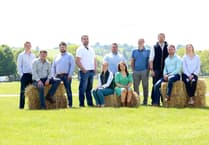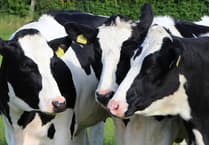It will not have escaped readers’ attention that the sun has been shining on a consistent basis in recent weeks. For many livestock farmers, such weather has been a blessing, the dry conditions giving our newborn lambs and calves an easier start to life. However, a sustained dry spell also brings its challenges, not least for crop growth in the short term and stores of animal feed in the medium to long term.
It is against this backdrop that I feel I must write about the Climate Change Committee’s (CCC) recent fourth carbon budget for Wales report. This document provides advice to Welsh Government on a proposed pathway to reduce carbon emissions, with suggested actions that each sector should take. As a farmer, this document made for alarming reading. The guidance suggests a 19% reduction in Welsh livestock numbers by 2033, compared to the size of our national herd and flock in 2022, using much of the freed up land to plant trees.
NFU Cymru has strongly rejected the CCC’s recommendations as they do not acknowledge the multi-faceted benefits of livestock farming to Wales’ environment and biodiversity, nor do they truly reflect the detrimental impacts such destocking would have on tens of thousands of jobs on farm and the many more in the wider Welsh food and drink sector, our rural communities, culture, landscape and the Welsh language, or the offshoring of production.
While Welsh agriculture is responsible for around 16% of emissions, the sector is also unique in that it holds much of the potential to tackle the effects of climate change, too. As a sector we are continually innovating and adopting low carbon farming practices to reduce our emissions. Moreover, the science suggests the carbon benefits of tree planting are variable and dependent on a range of factors such as species, site, soils, growth rates and the final use of timber – it is not a panacea.
The CCC report makes reference to Port Talbot’s steelworks and the mistakes that were made – and the negative economic and social impacts suffered - in its well-publicised transition to an electric furnace. NFU Cymru has always highlighted that farmers are a key part of the solution to tackling the impacts of climate change; however, we are clear that lessons must be learnt and climate targets should not cause similar harm to another iconic industry of Wales.
Despite the current weather, Wales’ climate still lends itself to being a leader in the production of healthy and nutritious food. We know that there is more we can do – ‘if better is possible, then good is not enough’ – but following advice that would cause devastating and irreversible harm to the legacy of generations of Welsh family farms, endanger the jobs of over 50,000 people who work on Welsh farm and removes the foundations of Wales’ £9billion food and drink industry, is unthinkable. Causing such damage to our economy, and the communities equipped with the expert skills and knowledge to help negotiate through this challenge, weakens, not strengthens, our prospects.





Comments
This article has no comments yet. Be the first to leave a comment.